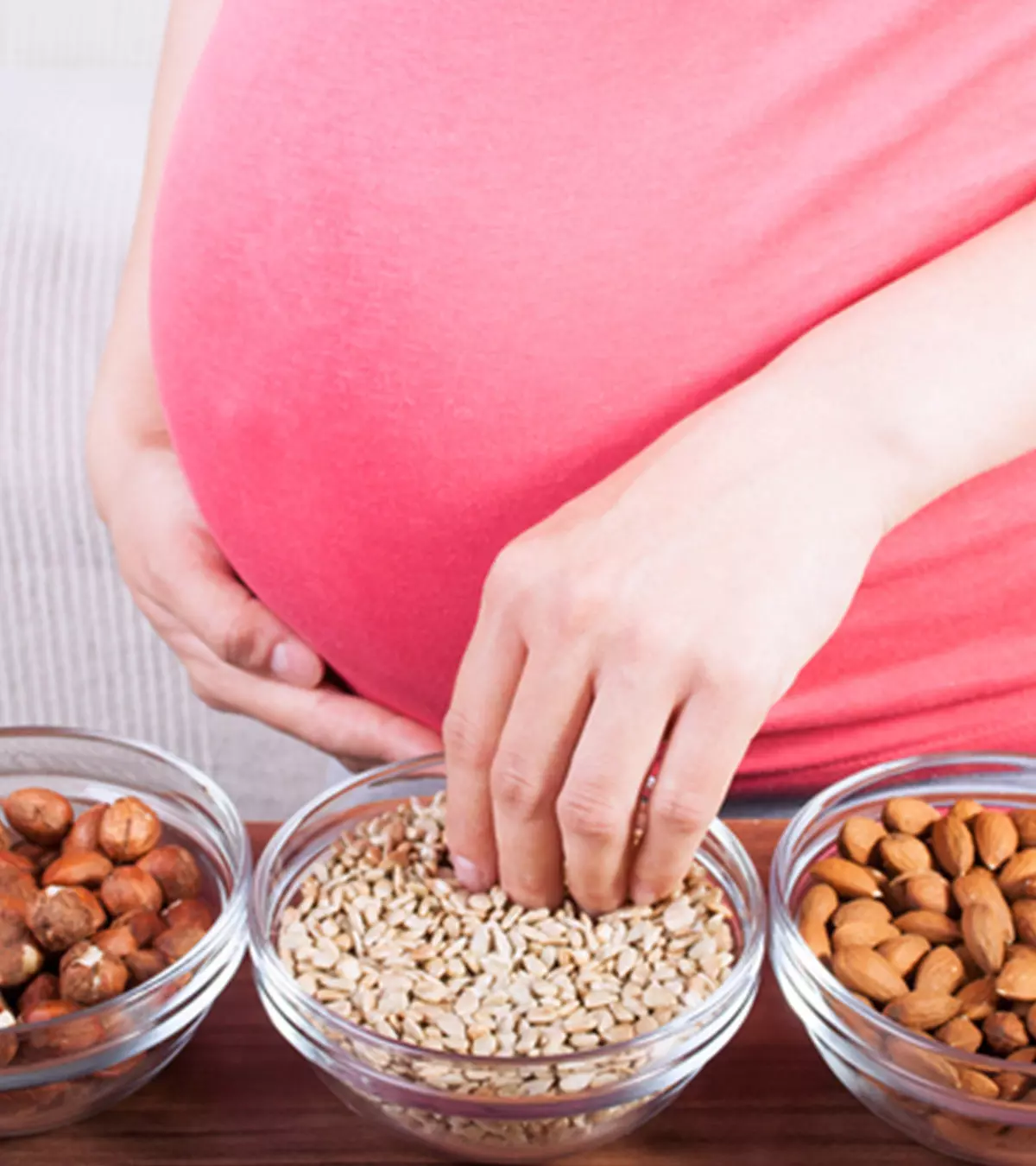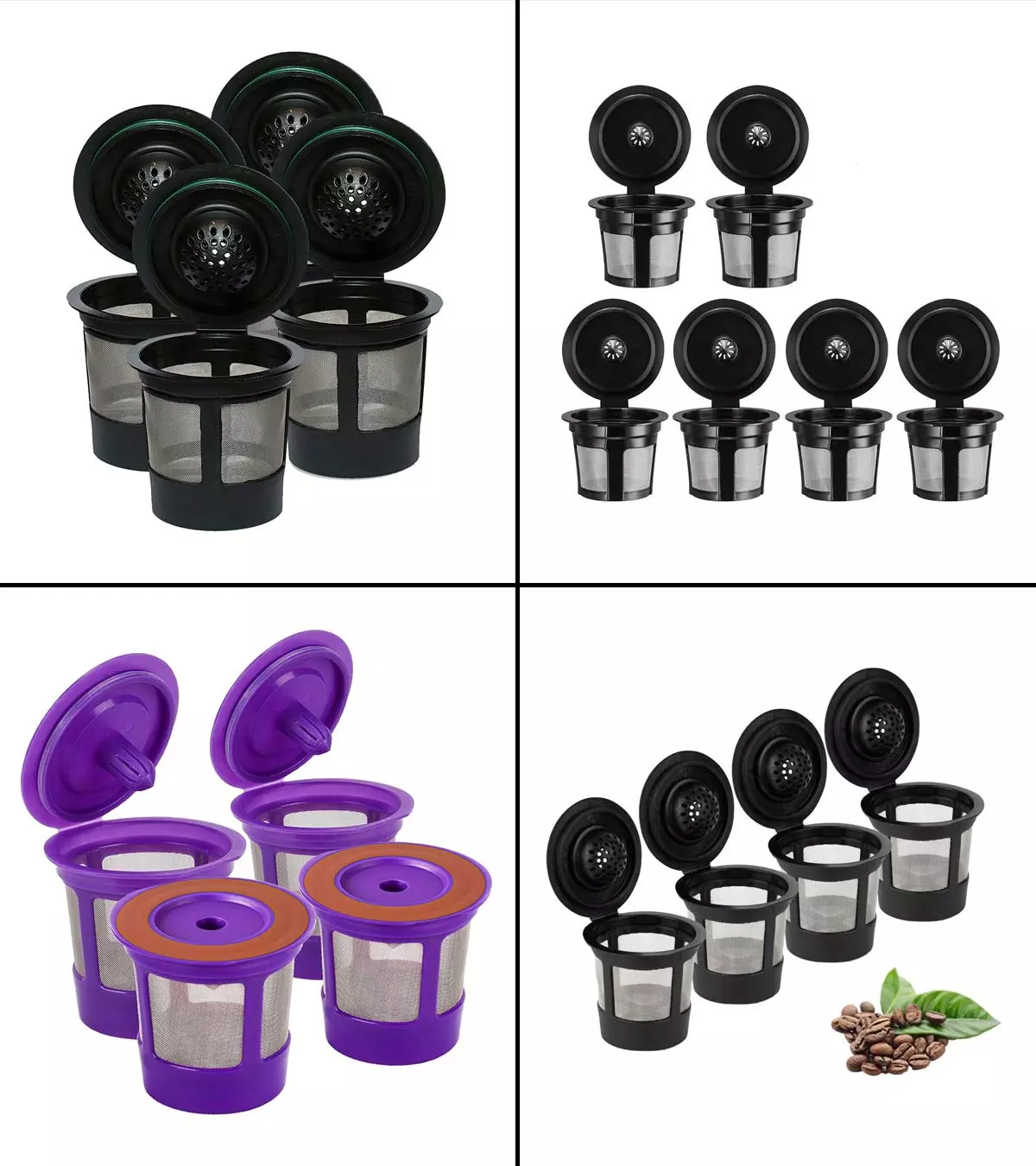

Image: Shutterstock
Eating nuts during pregnancy may have several health benefits because they are loaded with vitamins, minerals, folic acid, and other nutrients required for the baby’s healthy development.

However, women should be cautious about excessive consumption of nuts during pregnancy as some babies may develop allergies. Therefore, if you have a family history of nut allergies, it is recommended to avoid them during pregnancy. However, consult your doctor before making this decision.
Read this post to understand whether it is safe to consume nuts during pregnancy, the side effects, and some useful recommendations from experts.
Nutritional Benefits Of Nuts During Pregnancy
Nuts contain plenty of important nutrients that are particularly essential during pregnancy. Pregnant women must consume 75 to 100 g protein on a daily basis (1). One ounce of nut contains 2 ounce of protein as per USDA.
Here are some facts about nuts (2):
- Nuts are a rich source of vitamin B and E.
- Essential minerals such as phosphorous, potassium, zinc, selenium, copper are also present in high amounts that are essential for proper development of the fetus.
- Nuts are a good source of fat.
- The shelled nuts must be stored in airtight containers or in a fridge to ensure they do not go rancid.
- Nuts roasted in oil contain unnecessary calories and a high amount of protein.
- Nuts when toasted taste good, but reduce the nutrient content.
- Nuts such as peanuts, almonds, cashews and walnuts are high in fat and are good sources of minerals and vitamins.
- Nuts can be a good choice when you are looking for healthy snacking options.
- Nuts are high in healthy fats that can help lower cholesterol levels and prevent heart disease. They’re also packed with protein, fiber, vitamins, minerals and antioxidants. Here’s what else they have going for them:
- Nuts contain monounsaturated fatty acids (MUFAs), which may reduce your risk of cardiovascular disease. MUFAs include oleic acid, which is abundant in olive oil and other vegetable oils.
- Nuts are rich in vitamin E, which helps protect against oxidative damage caused by free radicals.
- Nuts provide good amounts of magnesium, manganese, copper, zinc, iron, calcium, phosphorus, selenium, iodine, riboflavin, niacin, thiamine, pantothenic acid, folate, B6, and fiber.
- Nuts contain phytosterols, which may help lower cholesterol levels.
- Nuts offer a great snack option, especially if you like nuts but don’t want to eat too many calories. A handful of almonds has only about 100 calories, while a handful of peanuts contains around 200 calories.
Dr. Ruchi Gupta working in Chicago, at the Northwestern University Feinberg School of Medicine, states that pregnant women must incorporate nuts in their diets as these are a good source of protein and folic acid. These essential nutrients help prevent neural tube defects as well as nut sensitization in babies.
Important Considerations
You just read about that eating nuts can help your baby. At the same time, the chances of your child getting allergic to nuts or developing problems like asthma are common with high consumption of nuts during your pregnancy.
- Anything in excess is harmful; this is applicable to nuts too.
- Children are likely to develop egg or milk allergies, if the mothers consumed nuts during early pregnancy.
According to a study in Journal of Allergy and Clinical Immunology (Oct 2010), if you consumed nuts everyday during pregnancy, there are chances of your child developing asthma compared to the mothers who didn’t consume nuts at all.
Recommendations From Experts
The lead researcher on asthma studies Saskia Willers states that it is not enough to recommend pregnant woman to avoid eating nuts when they are pregnant.
- In case asthma runs in your family, avoid eating nuts during pregnancy, as the baby in your womb has already developed the risks for the conditions.
- Willers further say, “It could be that the allergens in nuts are transferred to the baby in the uterus, increasing the risk of sensitization and therefore raising their chances of developing the condition.”
- The Food Standards Agency also advises pregnant mothers with family history of allergies to avoid eating nuts in pregnancy and while breastfeeding as well.
Leanne Male at the Asthma UK was noted saying, “With one child being admitted to hospital every 16 minutes with their asthma, it is vital for research to consistently identify which foods can help ward off asthma in children.”
The Final Word
According to some experts, amount of nuts to eat during pregnancy should be limited so that it may lower the risk of your child becoming allergic to nuts.
- Children, who eat nuts from their early childhood, tend to stay protected from the allergy, though a lot more research is needed on this subject (2).
- If you are reluctant to eat nuts or foods containing walnuts, cashew nuts and almonds, you can get in touch with your midwife or GP.
- If you have allergic conditions running in your family, you must make it a point to consult with the experts.
Frequently Asked Questions
1. What nuts should be avoided during pregnancy?
Avoid any nuts you are allergic to during pregnancy. Peanuts, pine nuts, walnuts, pecans, almonds, and Brazil nuts are common triggers of allergic reactions. Even if you are not allergic to nuts, your doctor may advise you to avoid nuts or consume them in moderation if nut allergy runs in your family. However, always consult your doctor before omitting foods from your diet during pregnancy.
2. Which nuts are good for pregnancy?
Nuts are nutrient-dense and can thus be beneficial during pregnancy. You could consume any nut except those that may trigger an allergic reaction. However, consult your doctor to know which nuts are safe to consume and which should be avoided based on your health condition.
You already know the vast nutritional benefits of nuts. They provide essential calories and nutrients necessary for pregnant women. However, there may be situations where a pregnant woman may have to restrict or avoid consuming nuts during pregnancy. For example, if nut allergies or asthma runs in your family, you should talk to your healthcare provider before including nuts in your diet. Your nutritionist can review your medical and family history to help you understand the safety and proper amounts of nuts that you can consume during pregnancy.
Infographic: Healthy Nut Substitutes For Expecting Moms With Allergies
Nut allergy does not lead to nutritional deficiencies, provided you include the right foods in your diet. Our infographic enlists some healthy foods you can safely consume during pregnancy to fulfill your dietary needs if you have nut allergies. Illustration: Momjunction Design Team
References
- Pregnancy Nutrition.
https://americanpregnancy.org/healthy-pregnancy/pregnancy-health-wellness/pregnancy-nutrition/ - Benetta Chin et al.; (2014); Early exposure to food and food allergy in children.
https://www.ncbi.nlm.nih.gov/pmc/articles/PMC4046529/
Community Experiences
Join the conversation and become a part of our nurturing community! Share your stories, experiences, and insights to connect with fellow parents.
Read full bio of Reda Elmardi
















